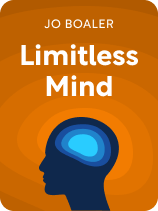

This article is an excerpt from the Shortform book guide to "Limitless Mind" by Jo Boaler. Shortform has the world's best summaries and analyses of books you should be reading.
Like this article? Sign up for a free trial here.
Are you a slow learner? Do you feel pressure to learn faster? How much do you learn when you cram for a test?
Imagine that the tortoise and the hare are in a learning race. Now, imagine the tortoise crossing the finish line first. In Limitless Mind, math educator Jo Boaler explains why slow learning gives you an advantage.
Keep reading to learn how being a slow learner can put you ahead.
Learn Slowly, Not Quickly
Research has debunked a long-held belief that’s contributed greatly to students’ dislike of learning—the idea that intelligence is tied to quick thinking. In fact, the opposite is true. Boaler shows that being a slow learner isn’t something you necessarily should try to fix.
Boaler explains that, much like a computer, your brain has two different types of recall: your active memory (what you’re thinking about right now) and long-term memory. Timed tests engage your short-term active memory, but the information stored there is quickly lost and replaced as soon as it isn’t needed. This is why “cramming for a test” doesn’t result in true learning—you’ve simply trained your brain to temporarily store facts, regurgitate them, then clear them from your mind to make room for the next cramming session.
(Shortform note: While Boaler explains that knowledge in short-term memory is easily lost, she doesn’t go into detail about why. In Ultralearning, Scott Young lists several theories: First, that memories naturally decay. Second, information has to compete for space in your brain, so different concepts and skills can interfere with each other as your mind tries to absorb them. Third is the theory that your memories may still be there but that you’ve forgotten how to access them, as in the case when a person’s name is “on the tip of your tongue.”)
A different issue with speed-based testing is that it produces anxiety, which shuts down your brain’s active memory. You’ve experienced this when someone asks you an urgent question and you suddenly can’t remember the answer. Boaler says that forcing students into this trap via timed testing creates negative associations around learning. In reality, the experts in any field of knowledge are those who think slowly and deeply about a subject. Slow thinkers outperform quick thinkers in the long run because spending a lot of time to understand a subject engages your brain’s long-term memory and builds understanding by creating more and stronger neural pathways than quick thinking does.
(Shortform note: Another reason the slower approach can be more effective than rapid problem-solving is that it gives you time to incorporate both hemispheres of your brain into the learning process. In A Mind for Numbers, Barbara Oakley refers to this as “diffuse-mode thinking,” which occurs when your mind is at rest and your thoughts have the luxury to explore longer neural pathways. Diffuse-mode thinking lets you come up with more creative solutions than you could when under a time crunch, which is why when you’re stuck on a problem, it’s effective to just walk away and let your mind wander.)

———End of Preview———
Like what you just read? Read the rest of the world's best book summary and analysis of Jo Boaler's "Limitless Mind" at Shortform.
Here's what you'll find in our full Limitless Mind summary:
- Why everything you thought you knew about natural abilities is wrong
- Why attitude is more important than aptitude when it comes to learning
- How to apply the science to boost your learning






